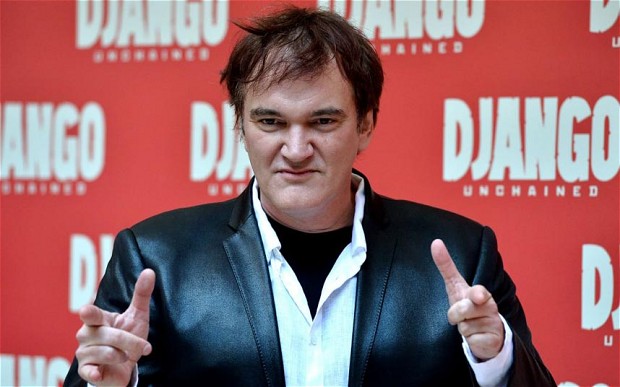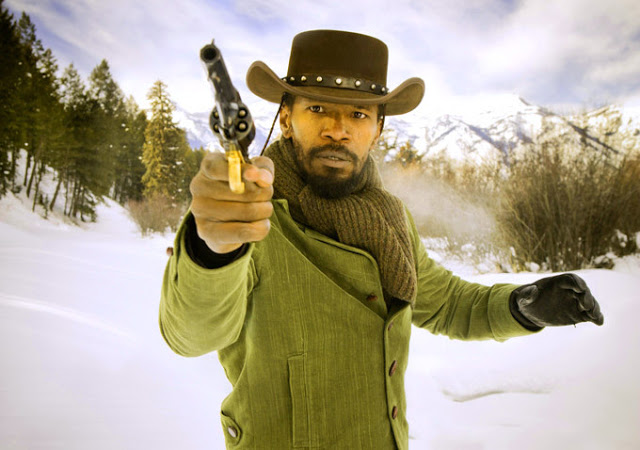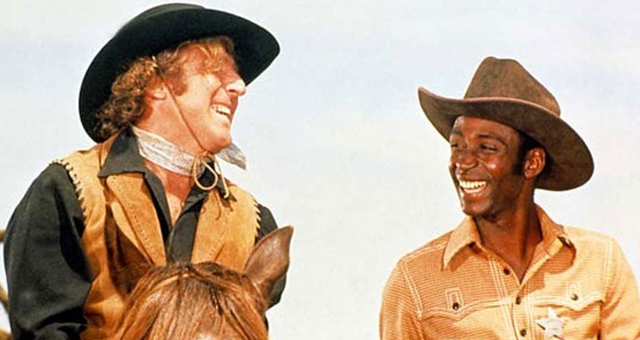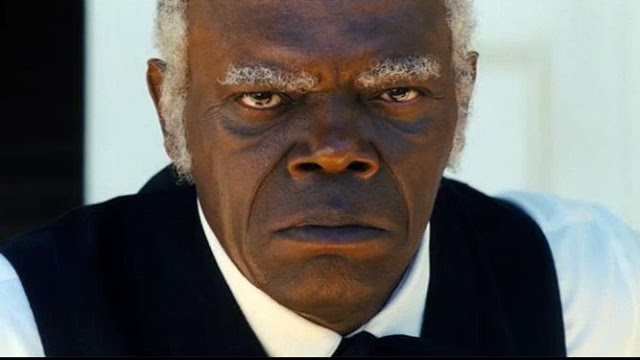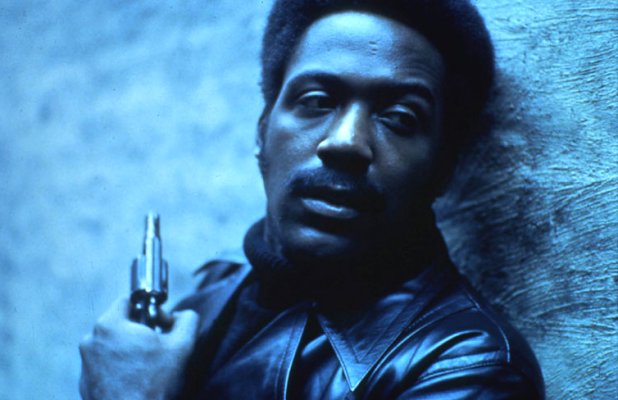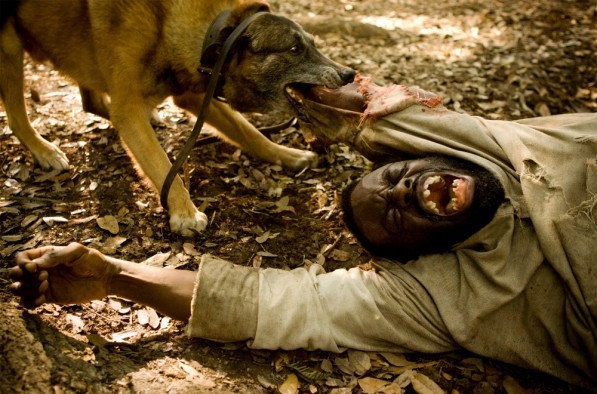So many thoughts about Django Unchained.
It’s incendiary, profane, hilarious and ultra-violent in classic Quentin Tarantino fashion, but there’s more under the surface. To me, Tarantino’s collective body of work now has depicted a real-world Looney Tunes of our modern American culture turned inside-out. And with all the connections between Tarantino’s separate projects, I now think of them all as belonging to the same world.
In nerd talk, a Tarantinoverse that plays on the modern American psyche.
And what figures into the modern American psyche like World War II and slavery? Hence we receive Inglorious Basterds (2009) and Django Unchained (2012).
Basterds parodied the World War II movie as a meta-commentary on Hollywood’s practice of killing Nazis over and over in the movies. Django continues this trend, by using the Western revenge film as a window into slavery. You know, the thing we don’t talk about in America.
More than enough people have written extensively with their opinions on the film, from discomfort and disgust to satisfyingly entertained. I’m not gonna get into that.
But this blerd would be remiss not to discuss the many, many thoughts Django has unearthed in my head.
So how about we just run through them, shall we?
It’s still jarring to see a black face in a white space.
Django is a Western revenge movie. We’ve seen this movie a million times. Tough-guy hero loses his woman, he goes to get her back, and bloody justice prevails.
But in the Tarantinoverse, you don’t gloss over race and slavery as those old Westerns always did. (Those movies have lots of American Indians, but from the white man’s point of view.) And this also means the cowboy doesn’t have to be white.
There’s a long history of black actors playing cowboys, but they get mentioned far down the list from the likes of John Wayne, Roy Rogers, Gene Autry and others.
So when Hollywood lets loose a Western with a black lead actor, it can’t help but be subversive. And then Tarantino’s gotta go one more step by having Django run around shooting racists. And then he makes it funny.
BLAZING SADDLES finally has a true companion.
Mel Brooks‘ Blazing Saddles is ablaze with postmodern comedy genius, and wicked racial satire to boot. Blazing Saddles was unflinching about the racism of its time period and so liberally used the word nigger.
And so does Django.
Saddles came in the time before we started calling it“the N-word,” but it still was considered taboo to bring it up. Now Django comes along 30-something years into hip-hop, which has popularized the traditionally “in-house” nigga to everyone in song after song.
After hip-hop and Chris Rock‘s infamous black people-vs.-niggas routine from the Bring the Pain special, now everyone knew that black people call each other nigga, despite us black people telling all non-black people they couldn’t call us that.
Now the popularity of hip-hop to non-black audiences makes this even crazier, by selling the word to a majority of customers who can’t ever say it. Even though their quoting the rapper who sold them the song to sing along to. Even though Jay-Z dares them to at his concert because it’s part of the chorus.
Django rolls between the two poles. White characters call black people niggers, a lot. Black characters hurl nigga at each other. Or, in Stephen the house slave‘s case, nigger when talking to his white masters, and nigga to Django in a manner both familial and contemptuous. And sometimes funny, sometimes dramatic.
Just like Blazing Saddles, Django Unchained shows racism as incredibly silly except for being so devastating. The town runs for cover when Black Bart prefaces reading a writ by saying “Excuse me while I whip this out,” and in Django a town gets up in arms over a black man riding a horse.
Blazing Saddles depicts the white railroad overseers going hogwild over Negro worksongs, while Black Bart and his compatriots opt for Gershwin. With Django Unchained, Quentin Tarantino completes his most thorough adaptation of black culture, as Jamie Foxx gets to wear the proverbial (and literal) white hat as a Western hero.
It’s an old dynamic of American culture. Stuff made by black people gets picked up by white people for the sake of cool. Black people keep moving into white provinces for “crossover” cool as opportunity continues to spread. A common criticism of Tarantino is how he exhibits false ownership of black culture. But if not for that, would we have the American culture that exists? I think he plays with the idea of ownership more than doing actual co-opting.
Now that’s what a sellout is.
Samuel L. Jackson appears in Django as Stephen, the house slave to end all house slaves. Looking like Uncle Ben leaped off the box of rice, Stephen winds up being as much a villain as the racist whites who stand in Django’s way.
Stephen also gets some of the best lines in the movie, as someone so happy to serve his white masters that he upholds that awful hierarchy more than them. You don’t get Stephen’s motivation for acting the way he does, but you get the idea that this system serves him, so he serves it no matter what.
That division between house and field slaves plays out in black-on-black relations to this day, and furthered the idea that doing anything considered to be a white province makes you more in league with the oppressors.
I’ve faced my share of race traitor talk. But it takes a Stephen to show you what that really means.
If movies are real in the Tarantinoverse, then I know where Django fits.
If Quentin Tarantino was attempting to make the black action hero to end all black action heroes, he may have done it this time. And when you really think about it, Django takes black heroes real and imagined and collapses them into a some kind of omni-hero, from Kunta Kinte to John Shaft.
In fact, literally Shaft. Django’s wife is named Broomhilda von Shaft. As if when Broomhilda and Django ride off into the night together, they will propagate a line of the baddest black people ever. And one of those descendants eventually brings us to the black private dick who’s a sex machine to all the chicks.
Which brings us back to the exploitation grindhouse classics that Tarantino spent his youth soaking up. The circle is made complete.
In the Tarantinoverse, movies are as real as real life.
Makes me wonder about Foxy Brown and Cleopatra Jones‘ ancestors.
History is an abbatoir, and anyone who talks about “the good old days” forgets this.
Most historical movies spend so much time making everything and everyone look so elegant. They get fixated on costumes and wigs and candlelight and all that.
Django definitely has some of that cinematographer’s cream-dream material, but the film puts it side-by-side with the savage brutality that makes such a gilded gentry possible. You ride up to the grand plantation house, and on the side of the main entrance is the hotbox. A casino house features two men beating each other to death in the upstairs parlor. Runaways are torn apart by dogs.
Whenever someone says, “we should go back to the days when,” my answer is always no.
Alternative black history, and the miracle of survival.
There can’t be an alternate Afro-American history without slavery. It’s the fire in which black Americans were forged. It’s the driver of the Afro-American experience. It reaches from the past and digs its serrated claws into the present yet remain slippery when you try to remove its hand.
But if you’re going to create an alternate Afro-American history, then I’m good with this one. It points to something I’ve long thought about when it came to black people in particular. Each black American person descended from black people who came to America by slavery, or lived here in the slavery era, is an evident product of survival.
Whether in the field or in the house, we survived.
That despite the horrors of slavery, destruction of culture and erasing of traditional memory, we are still here.
Enough of us made it through that hell, and the continued discrimination and bigotry that followed and still follows centuries later.
Now Jamie Foxx can go and exact grindhouse cinematic vengeance in 2012.
And my college-educated self can sit in any seat of a movie theater with my interracial marriage and enjoy watching Foxx do that.





































































































